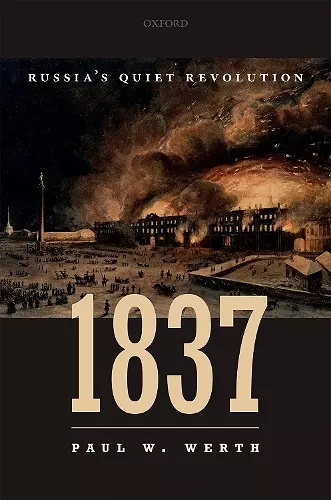1837
Russia's Quiet Revolution
Format:Hardback
Publisher:Oxford University Press
Published:12th Feb '21
Currently unavailable, and unfortunately no date known when it will be back
This hardback is available in another edition too:
- Paperback£19.49(9780198826361)

Historians often think of Russia before the 1860s in terms of conservative stasis, when the "gendarme of Europe" secured order beyond the country's borders and entrenched the autocratic system at home. This book offers a profoundly different vision of Russia under Nicholas I. Drawing on an extensive array of sources, it reveals that many of modern Russia's most distinctive and outstanding features can be traced back to an inconspicuous but exceptional year. Russia became what it did, in no small measure, because of 1837. The catalogue of the year's noteworthy occurrences extends from the realms of culture, religion, and ideas to those of empire, politics, and industry. Exploring these diverse issues and connecting seemingly divergent historical actors, Paul W. Werth reveals that the 1830s in Russia were a period of striking dynamism and consequence, and that 1837 was pivotal for the country's entry into the modern age. From the romantic death of Russia's greatest poet Alexander Pushkin in January to a colossal fire at the Winter Palace in December, Russia experienced much that was astonishing in 1837: the railway and provincial press appeared, Russian opera made its debut, Orthodoxy pushed westward, the first Romanov visited Siberia-and much else besides. The cumulative effect was profound. The country's integration accelerated, and a Russian nation began to emerge, embodied in new institutions and practices, within the larger empire. The result was a quiet revolution, after which Russia would never be the same.
Paul Werth makes a compelling argument...In a series of concise and well-written sketches, he demonstrates the breadth and depth of his familiarity with the secondary literature and his great skill at integrating these in a thoughtful, proactive manner. * ABBY M. SCHRADER, Franklin & Marshall College, Lancaster, English Historical Review *
This is a fascinating and highly readable book. * Alexander M. Martin, Canadian-American Slavic Studies *
With admirable concision and insight, Werth investigates eight novelties of the 1830s across the worlds of culture, politics, religion and industry. Taken together, he suggests, these changes add up to "Russia's quiet revolution". * Douglas Smith, Times Literary Supplement *
Werth combines solid historical research with a lively and occasionally playful style that makes his book an entertaining read. * Maria Lipman, Foreign Affairs *
Reflecting the accumulated wisdom of decades of historical research and writing, this highly readable history reimagines Imperial Russian history in a new and creative way. While focusing on a particular year, it is broad in its coverage, providing a superb introduction to the nineteenth century Russian Empire for experts, students and non-experts alike. * Dr. Andrew Jenks, Professor of History, California State University, Long Beach *
This book on the year that heralded Russia's entry into the modern age covers an astonishing breadth of fascinating subjects and is pure pleasure to read. * Dr Laurie Manchester, author of Holy Fathers, Secular Sons: Clergy, Intelligentsia and the Modern Self in Revolutionary Russia *
With a winning combination of deep erudition and wry humour, Paul Werth takes us on a vivid and compelling tour of the year 1837. His book makes any number of unexpected and illuminating connections. It will surely do much to shift our perspective on this historical moment, and on modern Russian history as a whole. * Stephen Lovell, King's College London *
This rich and thought-provoking study will certainly not disappoint its readers. * Anna Cavazzoni, Ab Imperio *
The codification of the laws is arguably the most important event of the 1830s and adds weight to Werth's overall argument, but it came two years early. Such caveats make the book ideal for discussion in graduate seminars. Werth's writing is light, concise, with occasional humor, and its short chapters with separate conclusions are ideal for classroom use. * Katherine Pickering Antonova, Journal of Modern History *
ISBN: 9780198826354
Dimensions: 240mm x 165mm x 20mm
Weight: 492g
240 pages